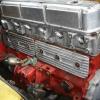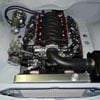
How important is a PCV valve???
#1

Posted 29 March 2007 - 03:08 PM
1. Pollution reasons - crankcase fumes are sucked back into the intake airstream and burnt/expelled inside the combustion chamber.
2. The vacuum helps relieve pressure from the crankcase
What I want to know is more info on point 2. Exactly how important is this? So many people just run breathers without a PCV, some use catch cans and breathers, also without a PCV. Does this have any effect on the engine? Obviously, if it's a heavy breather, it will be more likely to build up excess oil and possibly drip from the breather... but anything else???
#2

Posted 29 March 2007 - 03:35 PM
#3
 _73LJWhiteSL_
_73LJWhiteSL_
Posted 29 March 2007 - 06:12 PM
How much preasure it relieves is questionable. On a mate LC coupe, he had a sealed (non breather) oil cap on it and even with the PCV it generated enough preasure to push half the contents of his sump down the valves and burn it in a trip to hanging rock a few years ago.2. The vacuum helps relieve pressure from the crankcase
I would have through the PCV would do little more than allow crankcase fumes to be burn.
Steve
#4
 _devilsadvocate_
_devilsadvocate_
Posted 29 March 2007 - 06:27 PM
Edited by devilsadvocate, 29 March 2007 - 06:31 PM.
#5

Posted 29 March 2007 - 06:37 PM
The PCV shouldn't work at full throttle when blowby is high...as manifold vacuum is low and the spring should close the valve. Crank case pressure is then vented thru the pipe intop the air cleaner....so there is never a negative pressure in the sump.
at high manifold vacuum conditions crancase air is drawn thru the pcv valve into the manifold
#6
 _devilsadvocate_
_devilsadvocate_
Posted 29 March 2007 - 06:49 PM
Edited by devilsadvocate, 29 March 2007 - 06:56 PM.
#7

Posted 29 March 2007 - 09:56 PM
In this case I think positive is in reference to the fact that unlike earlier crankcase ventilation systems (ie the old hook pipe) this system actively attempts to evacuate the crankcase of vapors.
#8

Posted 29 March 2007 - 10:17 PM
Older engines with a lot of air would fume straight into the atmosphere, PCV's limit some of that by recycling the fumes.
#9
 _DocDamage_
_DocDamage_
Posted 29 March 2007 - 10:22 PM
Edited by DocDamage, 29 March 2007 - 10:22 PM.
#10

Posted 29 March 2007 - 11:07 PM
http://www.carbibles...eoil_bible.html
One commonly held belief is that moisture causes or accelerates the formation of sludge. We do not disagree, and we wonder if SAAB's trouble with leaking head gaskets contributes to the moisture content in the crankcase. We also wonder if the relative increase in the length of the crankcase ventilation "circuit" is preventing the removal of combustion gases in the crankcase.
http://www.saabservi...ne_failure.html
#11

Posted 29 March 2007 - 11:38 PM
That is why taxi engines last so long, they don''t have time to cool down and form water vapour and other corrosive mixes. Most of the damage to engines is done at startup and cold running, that is why short trips and stop start running on the way to the office is bad to the donk.When I was reading the oil bible it had a section on oil sludge and its causes. It appears that combustion gases and moisture in the crankcase are detrimental to oil.
http://www.carbibles...eoil_bible.htmlOne commonly held belief is that moisture causes or accelerates the formation of sludge. We do not disagree, and we wonder if SAAB's trouble with leaking head gaskets contributes to the moisture content in the crankcase. We also wonder if the relative increase in the length of the crankcase ventilation "circuit" is preventing the removal of combustion gases in the crankcase.
http://www.saabservi...ne_failure.html
#12

Posted 30 March 2007 - 01:05 AM
So we have definitely found several things out:
* The extraction & recirculation of crankcase gases assists in reducing condensation/acid buildup/sludge buildup... and helps to keep the engine oil cleaner longer, and therefore increasing the life of the engine.
* Obviously it reduces pollution by not venting these gases straight into the atmosphere.
That first point above, I believe is only an issue if regular oil & filter changes are not carried out. Would you agree with this??
It seems a huge factor in determining the frequency of oil changes is the number of short trips/cold starts etc... as well as things like how long the car is left sitting around for, esp in colder weather etc....
Ok, next question.... so not worrying about pollution, nor contaminated oil...
Does not having a PCV connected have any other affects? I've heard people say without it, it places extra strain on gaskets, seals etc... is there any truth to this? (Let's assume we're talking a big cube V8, fitted with a fully breathable cap to each rocker cover). Could this place extra strain on the seals and stuff??
Considering the huge amounts of air that an engine pumps, would these allow enough air both in and out of the crankcase???
And lastly... for racing purposes - it seems most racers always prefer to run no PCV... to maximise the cleanest possible intake air into their engine. We did a test on the dyno recently with my Chev.... 1st pass with PCV connected.... monitored air:fuel ratio's etc... then removed the PCV from the rocker cover and plugged it..... we then did a 2nd pass, and we could definitely see a slightly neater line... HP reading didn't actually change, but it certainly seemed to clean up the intake air... which could mean running bigger jets and making more HP according to my dyno guy.
#13
 _Keithy's_UC_
_Keithy's_UC_
Posted 30 March 2007 - 03:08 AM
Devils, it works on vacuum. There is no other technical explaination. A PCV Valve is a non-return valve that only opens when vacuum from the carb/manifold is present to suck the valve open.
Anyone running a KC Alloy rocker cover on a holden 6 will understand what i'm talking about. If you see a puff of oil smoke when someone gets off the gas in a recently rebuilt motor (like mine), its just the manifold vacuum sucking the vapours rather quickly from the motor and burning it at a rapid rate. It's a pollution requirememt on later model cars (and some Torries too!). Thats because the baffles in the KC rocker covers are piss weak!
Cheers
Keith
Edited by Keithy's_UC, 30 March 2007 - 03:13 AM.
#14
 _devilsadvocate_
_devilsadvocate_
Posted 30 March 2007 - 04:42 AM
The point about reducing unburnt combustion products(that get past the combustion chambers) is a good one..... Ive owned a couple of older cars that had breathable caps and they did blacken and thin their oil quite quickly(I know thats not definitive as the motors were old as well). On could conclude that the oil would need to be changed more frequently than a non pcv motor, unburnt petrol will still combine with the oil and a % will remain there even in a motor that is run continuously due to the continual higher pressure of petrol vapor(compared to a pcv equipped engine) in the crankcase while running.....whereas the water vapor and oil is generally not as easily mixed.....but can still create mayonaise in the rocker cover. ( I get small amounts of this in my pcv 202 when only doing short trips in winter) This is one reason that motors on lpg dont blacken their oil or suffer from fuel dilution in the oil.:
* The extraction & recirculation of crankcase gases assists in reducing condensation/acid buildup/sludge buildup... and helps to keep the engine oil cleaner longer, and therefore increasing the life of the engine.
* Obviously it reduces pollution by not venting these gases straight into the atmosphere.
That first point above, I believe is only an issue if regular oil & filter changes are not carried out. Would you agree with this??
It seems a huge factor in determining the frequency of oil changes is the number of short trips/cold starts etc... as well as things like how long the car is left sitting around for, esp in colder weather etc....
Ok, next question.... so not worrying about pollution, nor contaminated oil...
Does not having a PCV connected have any other affects? I've heard people say without it, it places extra strain on gaskets, seals etc... is there any truth to this? (Let's assume we're talking a big cube V8, fitted with a fully breathable cap to each rocker cover). Could this place extra strain on the seals and stuff??
Considering the huge amounts of air that an engine pumps, would these allow enough air both in and out of the crankcase???
And lastly... for racing purposes - it seems most racers always prefer to run no PCV... to maximise the cleanest possible intake air into their engine. We did a test on the dyno recently with my Chev.... 1st pass with PCV connected.... monitored air:fuel ratio's etc... then removed the PCV from the rocker cover and plugged it..... we then did a 2nd pass, and we could definitely see a slightly neater line... HP reading didn't actually change, but it certainly seemed to clean up the intake air... which could mean running bigger jets and making more HP according to my dyno guy.
In regards to power output, it would possibly be correct to assume that having more oxygen and more reactive fuel in the intake would be better than it being partially replaced by largely water vapor and CO2 and partially and unburnt fuel......hopefully the quantity of oil vapor sucked out of the engine would be small in comparison. Technically the mixtures would be slightly richer with a pcv installed , the unburnt products recycled would aid economy with the mixtures set to as near as stoich(though this difference would perhaps be insignificant) , yet reduce full power output.
Edited by devilsadvocate, 30 March 2007 - 04:45 AM.
#15
 _2X044_
_2X044_
Posted 30 March 2007 - 02:28 PM
Which torries came from the factory with a PCV system?
#16

Posted 30 March 2007 - 06:51 PM
It depends on what style of rocker cover you have, as to whether your oil cap is vented or not.....there are 2 and three hole rocker covers...2 hole have vented...3 hole are closed.
#17

Posted 30 March 2007 - 08:12 PM
so not running a pcv valve wouldnt have been the only cause of problems with oil in early motors.
#18
 _why-psi_
_why-psi_
Posted 30 March 2007 - 08:22 PM
#19
 _DocDamage_
_DocDamage_
Posted 30 March 2007 - 08:29 PM
In reference to the idea of a non PCV motor (gray motors etc) wouldnt they, theoretically blacken (dirty) oil quicker as they didnt run an oil filter anyway?
so not running a pcv valve wouldnt have been the only cause of problems with oil in early motors.
Oil filtration system was a Nasco accessory on the Oldies.
#20
 _devilsadvocate_
_devilsadvocate_
Posted 30 March 2007 - 08:50 PM
If you are referring to my reference of running cars without pcv's, the ones I owned werent holdens and ran oil fiters.In reference to the idea of a non PCV motor (gray motors etc) wouldnt they, theoretically blacken (dirty) oil quicker as they didnt run an oil filter anyway?
so not running a pcv valve wouldnt have been the only cause of problems with oil in early motors.
Possibly blocking this small amount of airflow is crucial to the correct mixture at idle.mine is weird. if i take out the pcv valve from rocker cover with engine running and block the pcv valve the engine runs like shit and stalls. anyone know why this could be?
#21

Posted 30 March 2007 - 11:38 PM
DA is correct, this unmetered air flow is factored into the carby design and tune so even a rocker cover gasket or side plate gasket leak can make a carby hard to tune on a holden six of this vintage as the motor is suppose to be sealed.mine is weird. if i take out the pcv valve from rocker cover with engine running and block the pcv valve the engine runs like shit and stalls. anyone know why this could be?
And always ensure your oil cap has a good seal.
#22
 _why-psi_
_why-psi_
Posted 31 March 2007 - 05:43 PM
#23
 _lurkin308_
_lurkin308_
Posted 02 April 2007 - 07:31 PM
cheers caine
#24

Posted 03 April 2007 - 12:45 AM
So do you have to weld in some kind of fitting into your collectors or what??? I'd be intersted to hear how easy they are to install... and if you notice any difference etc... keep us posted!!
#25

Posted 03 April 2007 - 05:07 AM
1 user(s) are reading this topic
0 members, 1 guests, 0 anonymous users



















